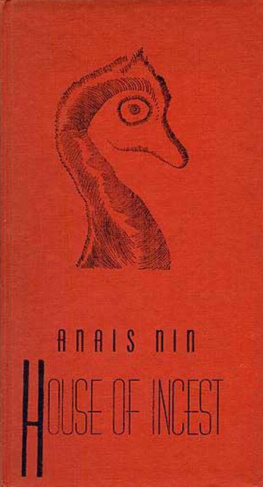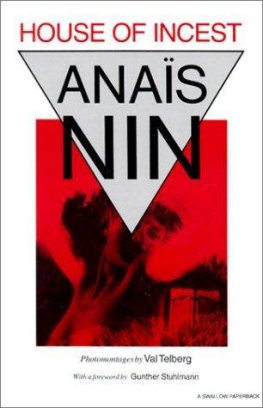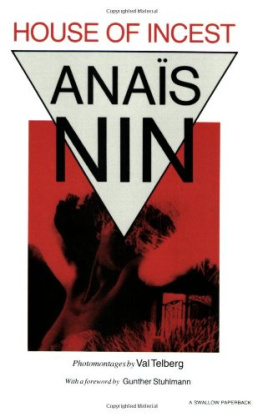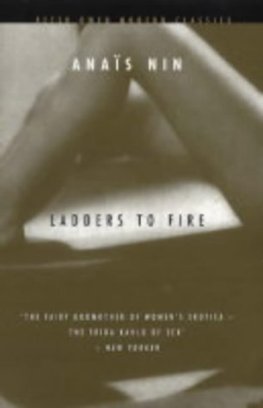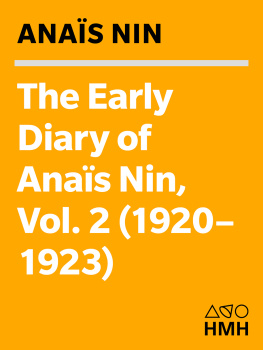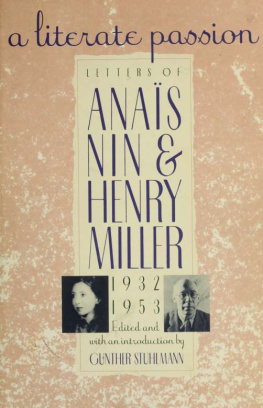Anais Nin - Ladders to Fire
Here you can read online Anais Nin - Ladders to Fire full text of the book (entire story) in english for free. Download pdf and epub, get meaning, cover and reviews about this ebook. year: 2004, publisher: PETER OWEN, genre: Non-fiction. Description of the work, (preface) as well as reviews are available. Best literature library LitArk.com created for fans of good reading and offers a wide selection of genres:
Romance novel
Science fiction
Adventure
Detective
Science
History
Home and family
Prose
Art
Politics
Computer
Non-fiction
Religion
Business
Children
Humor
Choose a favorite category and find really read worthwhile books. Enjoy immersion in the world of imagination, feel the emotions of the characters or learn something new for yourself, make an fascinating discovery.
- Book:Ladders to Fire
- Author:
- Publisher:PETER OWEN
- Genre:
- Year:2004
- Rating:3 / 5
- Favourites:Add to favourites
- Your mark:
- 60
- 1
- 2
- 3
- 4
- 5
Ladders to Fire: summary, description and annotation
We offer to read an annotation, description, summary or preface (depends on what the author of the book "Ladders to Fire" wrote himself). If you haven't found the necessary information about the book — write in the comments, we will try to find it.
Ladders to Fire — read online for free the complete book (whole text) full work
Below is the text of the book, divided by pages. System saving the place of the last page read, allows you to conveniently read the book "Ladders to Fire" online for free, without having to search again every time where you left off. Put a bookmark, and you can go to the page where you finished reading at any time.
Font size:
Interval:
Bookmark:

1959
BookI of CITIES OF THE INTERIOR
THIS HUNGER
LILLIAN WAS ALWAYS in a state offermentation. Her eyes rent the air and left phosphorescent streaks. Her largeteeth were lustful. One thought of a negress who had found a secret potion toturn her skin white and her hair red.
As soon as she came into a room she kicked offher shoes. Necklaces and buttons choked her and she loosened them, scarvesstrangled her and she slackened them. Her hand bag was always bursting full andoften spilled over.
She was always in full movement, in the centerof a whirlpool of people, letters, and telephones. She was always poised on thepinnacle of a drama, a problem, a conflict. She seemed to trapeze from oneclimax to another, from one paroxysm of anxiety to another, skipping always thepeaceful region in between, the deserts and the pauses. One marveled that sheslept, for this was a suspension of activity. One felt sure that in her sleepshe twitched and rolled, and even fell off the bed, or that she slept halfsitting up as if caught while still talking. And one felt certain that a greatcombat had taken place during the night, displacing the covers and pillows.
When she cooked, the entire kitchen wasgalvanized by the strength she put into it; the dishes, pans, knives,everything bore the brunt of her strength, everything was violently marshaled,challenged, forced to bloom, to cook, to boil. The vegetables were peeled as ifthe skins were torn from their resisting flesh, as if they were the fur of animalsbeing peeled by the hunters. The fruit was stabbed, assassinated, the lettucewas murdered with a machete. The flavoring was poured like hot lava and oneexpected the salad to wither, shrivel instantly. The bread was sliced with avigor which recalled heads falling from the guillotine. The bottles and glasseswere knocked hard against each other as in bowling games, so that the wine,beer, and water were conquered before they reached the table.
What was concocted in this cuisine reminded oneof the sword swallowers at the fair, the fire-eaters and the glass-eaters ofthe Hindu magic sects. The same chemicals were used in the cooking as were usedin the composition of her own being: only those which caused the most violentreaction, contradiction, and teasing, the refusal to answer questions but thelove of putting them, and all the strong spices of human relationship whichbore a relation to black pepper, paprika, soybean sauce, ketchup and redpeppers. In a laboratory she would have caused explosions. In life she causedthem and was afterwards aghast at the damage. Then she would hurriedly setabout to atone for the havoc, for the miscarried phrase, the fatal honesty, thereckless act, the disrupting scene, the explosive and catastrophic attack.Everywhere, after the storms of her appearance, there was emotionaldevastation. Contacts were broken, faiths withered, fatal revelations made.Harmony, illusion, equilibrium were annihilated. The next day she herself wasamazed to see friendships all askew, like pictures after an earthquake.
The storms of doubt, the quick cloudings of hypersensitivity, the bursts of laughter, thewet furred voice charged with electrical vibrations, the resonant quality ofher movements, left many echoes and vibrations in the air. The curtainscontinued to move after she left. The furniture was warm, the air was whirling,the mirrors were scarred from the exigent way she extracted from them an everunsatisfactory image of herself.
Her red hair was as unruly as her whole self;no comb could dress it. No dress would cling and mould her, but every inch ofit would stand out like ruffled feathers. Tumult in orange, red and yellow andgreen quarreling with each other. The rose devoured the orange, the green andblue overwhelmed the purple. The sport jacket was irritated to be in companywith the silk dress, the tailored coat at war with the embroidery, the everydayshoes at variance with the turquoise bracelet. And if at times she chose amajestic hat, it sailed precariously like a sailboat on a choppy sea.
Did she dream of being the appropriate mate forthe Centaur, for the Viking, for the Pioneer, for Attila or Genghis Khan, ofbeing magnificently mated with Conquerors, the Inquisitioners or Emperors?
On the contrary. In the center of this turmoil,she gave birth to the dream of a ghostly lover, a pale, passive, romantic, anaemic figure garbed in grey and timidity. Out of the veryvolcano of her strength she gave birth to the most evanescent, delicate andunreachable image.
She saw him first of all in a dream, and thesecond time while under the effects of ether. His pale face appeared, smiled,vanished. He haunted her sleep and her unconscious self.
The third time he appeared in person in thestreet. Friends introduced them. She felt the shock of familiarity known tolovers.
He stood exactly as in the dream, smiling,passive, static. He had a way of greeting that seemed more like a farewell, anair of being on his way.
She fell in love with an extinct volcano.
Her strength and fire were aroused. Herstrength flowed around his stillness, encircled his silence, encompassed hisquietness.
She invited him. He consented. Her whirlpoolnature eddied around him, agitating the fixed, saturnian orbit.
Do you want to comedo you?
I never know what I want, he smiled becauseof her emphasis on the want, I do not go out very much. From the first,into this void created by his not wanting, she was to throw her own desires,but not meet an answer, merely a pliability which was to leave her in doubtforever as to whether she had substituted her desire for his. From the firstshe was to play the lover alone, giving the questions and the answers too.
When man imposes his will on woman she knowshow to give him the pleasure of assuming his power is greater and his willbecomes her pleasure; but when the woman accomplishes this, the man never givesher a feeling of any pleasure, only of guilt for having spoken first andreversed the roles. Very often she was to ask: Do you want to do this? And hedid not know. She would fill the void, for the sake of filling it, for the sakeof advancing, moving, feeling, and then he implied: You are pushing me.
When he came to see her he was enigmatic. Buthe was there.
As she felt the obstacle, she also felt theforce of her love, its impetus striking the obstacle, the impact of theresistance. This collision seemed to her the reality of passion.
He had been there a few moments and was alreadypreparing for flight, looking at the geography of the room, marking the exitsin case of fire, when the telephone rang.
Its Serge asking me to go to a concert, saidLillian with the proper feminine inflection of: I shall do your will, notmine. And this time Gerard, although he was not openly and violently in favorof Lillian, was openly against Serge, whoever he was. He showed hostility. AndLillian interpreted this favorably. She refused the invitation and felt as ifGerard had declared his passion. She laid down the telephone as if marking adrama and sat nearer to the Gerard who had manifested his jealousy.
The moment she sat near him he recaptured hisquality ofa mirage: paleness, otherworldliness,obliqueness. He appropriated womans armor and defenses, and she took themans. Lillian was the lover seduced by obstacle and the dream. Gerard watchedher fire with a feminine delectation of all fires caused by seduction.
When they kissed she was struck with ecstasyand he with fear.
Gerard was fascinated and afraid. He was indanger of being possessed. Why in danger? Because he was already possessed byhis mother and two possessions meant annihilation.
Lillian could not understand. They were twodifferent loves, and could not interfere with each other.
Next pageFont size:
Interval:
Bookmark:
Similar books «Ladders to Fire»
Look at similar books to Ladders to Fire. We have selected literature similar in name and meaning in the hope of providing readers with more options to find new, interesting, not yet read works.
Discussion, reviews of the book Ladders to Fire and just readers' own opinions. Leave your comments, write what you think about the work, its meaning or the main characters. Specify what exactly you liked and what you didn't like, and why you think so.



